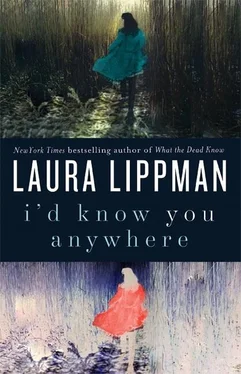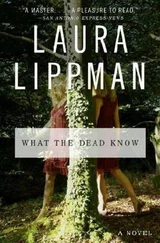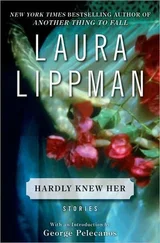“Iso?” she said, coming in through the garage.
“I’m in here, Mom.” Her voice showed not a hint of apprehension, which was maddening. She should be a little afraid to face Eliza after a meeting at school.
“Here?” she echoed.
“In the dining room, with your old teacher. We made tea.”
Oh, so that’s why you’re calm. You have a witness. You know I can’t bitch you out. Then: Old teacher?
She and Albie entered the formal dining room, which the family seldom used. The table had been set for a small but proper tea, the fish-shaped teakettle sitting on a trivet, cookies spread fanlike on a plate. They were Eliza’s secret cookies. More stealing? Was Iso trying to impress her mother, or the visitor, an incongruously well-dressed woman who was instantly, tantalizingly familiar to Eliza, her name just on the tip of her tongue, but the context made no sense. Teacher? She didn’t remember ever having such an elegant teacher.
“Trudy Tackett,” the woman said, standing up and holding out her hand. “I’ve been enjoying getting to know your daughter. She reminds me so much of my daughter at the same age.”
WALTER WAS OUTSIDE FOR HIShour of recreation for the first time in almost a week. Legally, the men on Sussex I were supposed to get an hour a day outside, but something was always coming up. They claimed they found a weapon, put the whole place in lockdown, then they said there was a piece of fence that needed repair, although they could have just not used that particular dog run, as Walter thought of the individual recreation yards the men used. Today, for example, there was no one on either side of him, no way to talk, or play a hand of cards. That was okay. He wasn’t feeling very sociable today. He was happy to be with his own thoughts, feel a little light on his face. He always had looked better with a tan, bad as it might have been for his skin, according to Barbara.
Back in the day, when Walter realized what his future was—what his lack of future was—and found that he could accept it, his first thought was: I’ll probably learn to play chess. He wasn’t sure where this idea came from. Like most people, he knew what he knew about prison from the movies, but this was before The Shawshank Redemption, before The Silence of the Lambs, although he now knew about both films from talking to men who had arrived here later. The one prison movie that Walter could have described in detail was actually about a juvenile facility, and no one there was playing chess, that was for sure. Bad Boys, with Sean Penn. He had never met another person who had seen the film, not since he was inside. Say Bad Boys and people immediately assumed you were talking about those other movies, which came way later.
Elizabeth had seen Bad Boys, though. She shouldn’t have—it was R-rated and she was only thirteen when it was released. He told her as much, but let the lecture drop because he was keen to know what she thought of it.
“I don’t know,” she said. “I like Sean Penn, but I wish he would do more movies like Fast Times at Ridgemont High . This one was so depressing.”
“That movie where the girl took her top off?”
“Yeah. He was funny in that.”
“He was stoned.”
“His character was.” Oh so prim and proper, as if he didn’t understand the difference.
“I just don’t think that’s funny, being high,” he said, and they had dropped the subject. They never agreed on movies or music. Still, he wished they could have talked more. He wanted to ask her if she thought the movie was right, about how much rape there was in prison, or if that was only in the juvenile places. Even then, in the back of his mind, he knew it was going to be prison or death for him, and he was actually more scared of the first. He could imagine death. He had seen death. He couldn’t imagine life in a cell.
But over the weeks, months, it took the system to sort out his crimes and decide how to punish him, Walter had come to understand and accept the contours of his life. Contours —a lovely word, exactly what it sounded like, a big round vase. He wasn’t going to be found innocent, not in the case of Holly or Maude, and that was all because of Elizabeth, the state’s star witness. Without her, they wouldn’t have had anything. She had found him at Maude’s grave, she had been there the night Holly died. It was lucky that he hadn’t given her specifics of the other things he had done. Oh, he had made vague references, especially in the beginning, when he had to get her to obey him. “If you knew the things I’d done…I’ve snapped a girl’s neck before and I’ll do it again.” But he had been cagey enough to withhold the specifics, and she couldn’t tell folks anything more than what she had seen. If only he had killed her —but he hadn’t, and that was that. Certainly he had known what would happen if they were caught, and he had realized, after Holly died, that such an outcome was more likely. Holly wasn’t the kind of girl whose disappearance and death went unavenged. This time, he had stolen a princess, and the kingdom was going to rise up, outraged. Sure enough, he was in custody less than forty-eight hours later, and that began the second half of his life, the part spent behind bars.
Still, in the early years, his days had some variety. There were the trials and, in the case of Holly, appeals and retrials. The first retrial had been filed before the twenty-one days expired, and no one could complain about that. Stupid woman juror had talked about the penalty phase, said she knew for a fact that he wouldn’t get death in Maryland, so they had to give it to him in Virginia. And the bitch would have lied, too, perjured her way through the investigation if she could have, but there were other jurors who were honest enough to admit the conversation had taken place. Then he had petitioned on the grounds of incompetent counsel, which hadn’t gotten him a new trial but had gotten him Jefferson, who was quite the busy little beaver. He was the one who had started poring over maps and begun to question whether Walter was in Virginia or West Virginia when Holly died. Yes, he knew folks were outraged when they got the order to send the surveyors out, that they talked about technicalities, how it was just a line on a map. But, hell, who wouldn’t want to be on the right side of a line that was literally the difference between life and death? If that campsite was on the West Virginia side, then he should have been tried in West Virginia, and West Virginia had no death penalty. Who could blame a guy for trying?
Eventually, life had settled into a slow gray haze. He did some of the things he set out to do. He read a great deal, especially military history. He practiced yoga. He corresponded with people who wrote to him, although no one had the staying power of Barbara LaFortuny. It seemed that the people, the women, who contacted him wanted something he simply couldn’t give. He thought about a religious conversion, but he found he believed less and less as time went on and he respected faith too much to fake it. If there was a God, then the world would make more sense. That much seemed clear to him.
But chess? No. He tried it, especially during that period when that nice army retiree was next to him in the yard. That guy, Hollis, said it was possible to hold a chessboard in your head and talk the moves. Over time, Walter learned to do that, but it was all he could do. The strategy of chess—the necessity of sacrifice, the impossibility of keeping every piece safe—bothered him. He hated sending those little pawns out into the world. And the games were long. He liked things that moved faster.
Читать дальше












